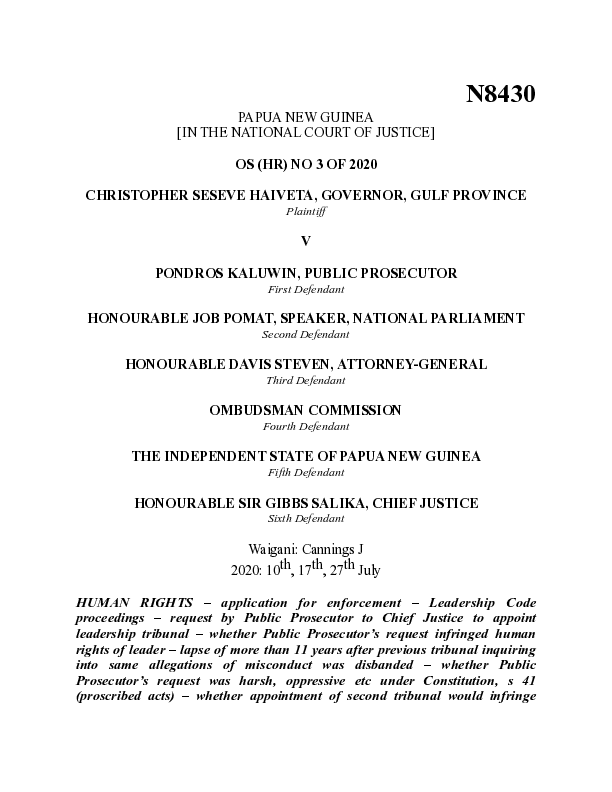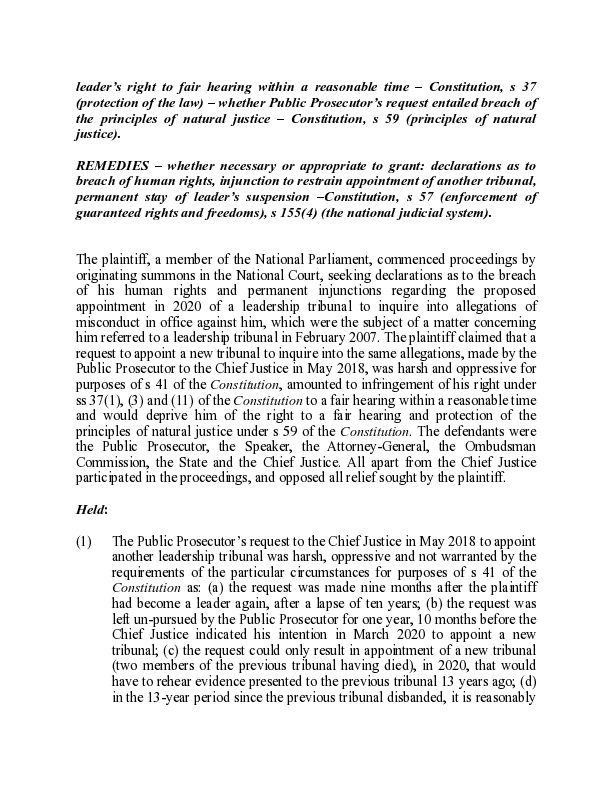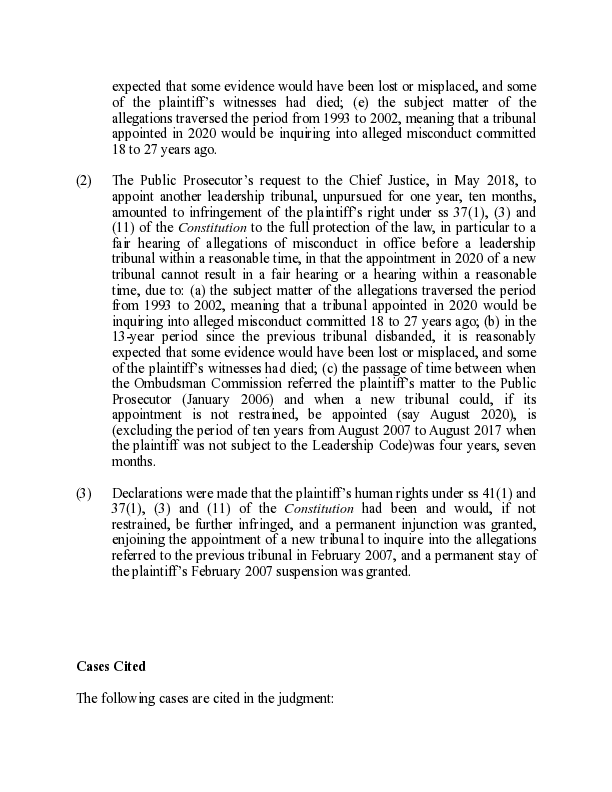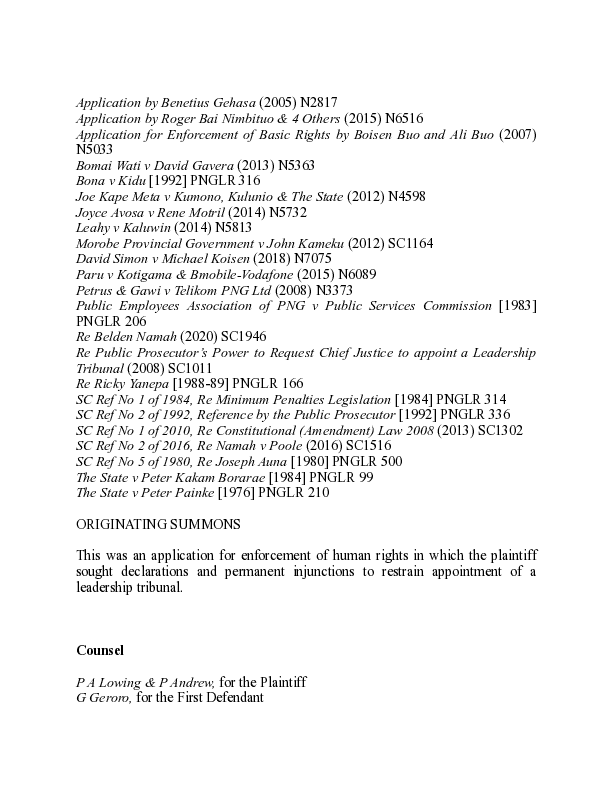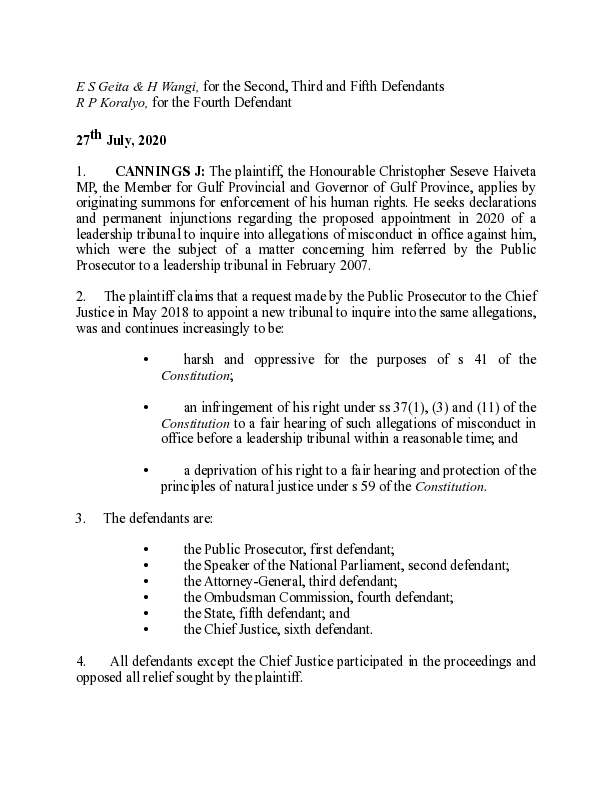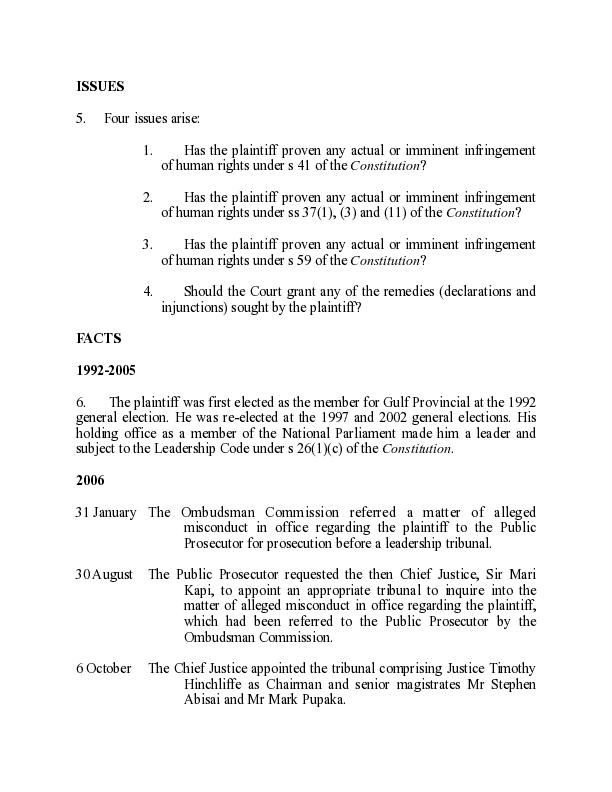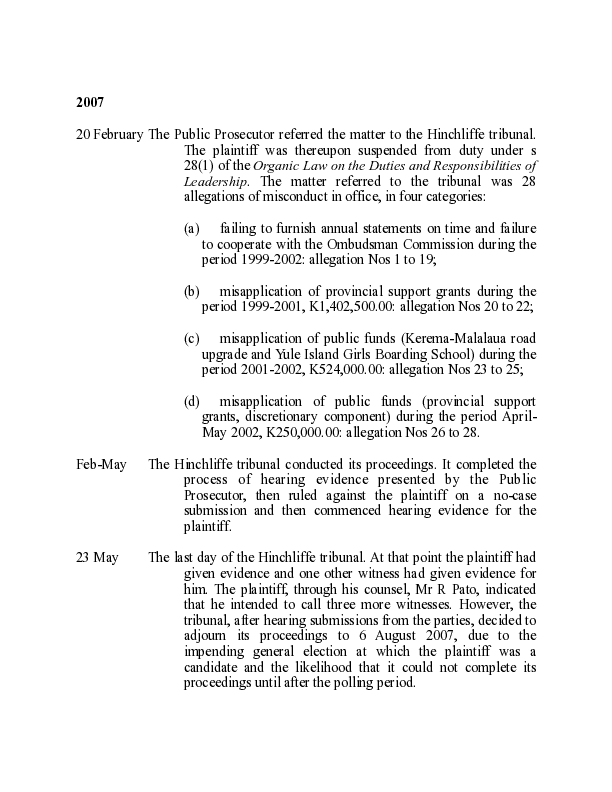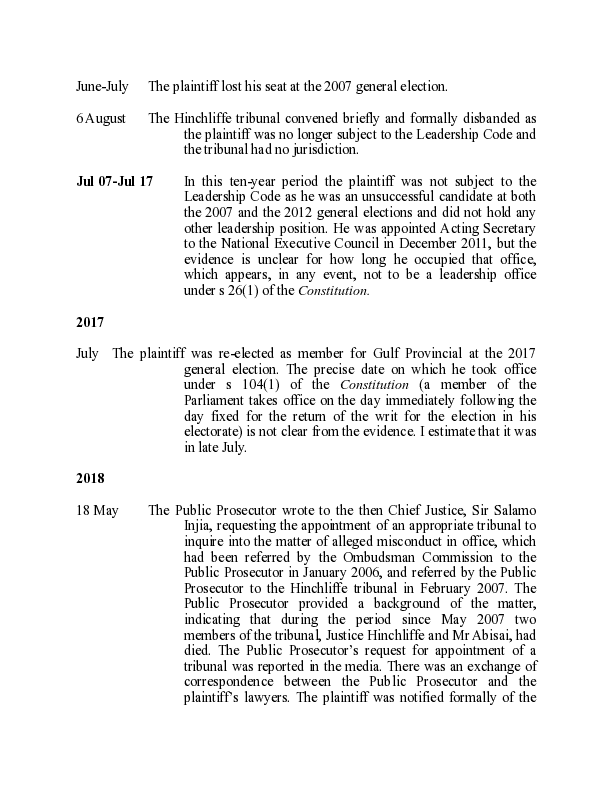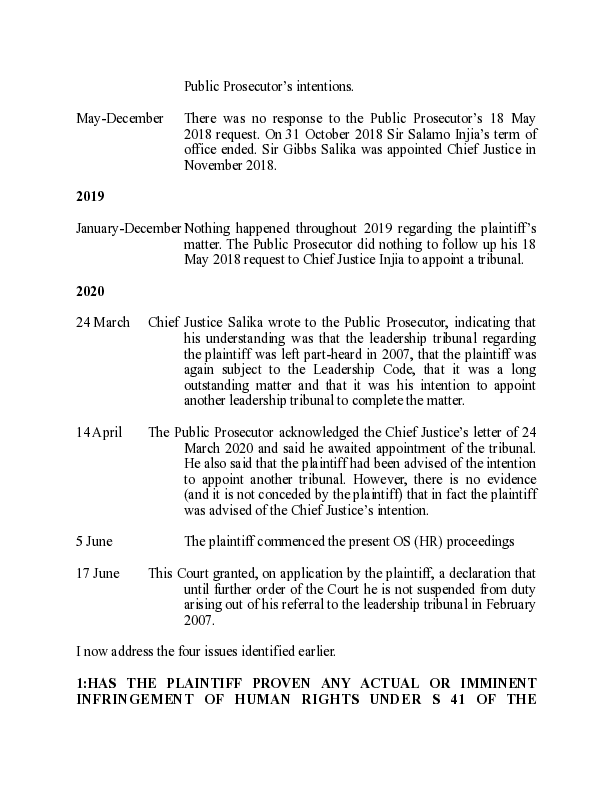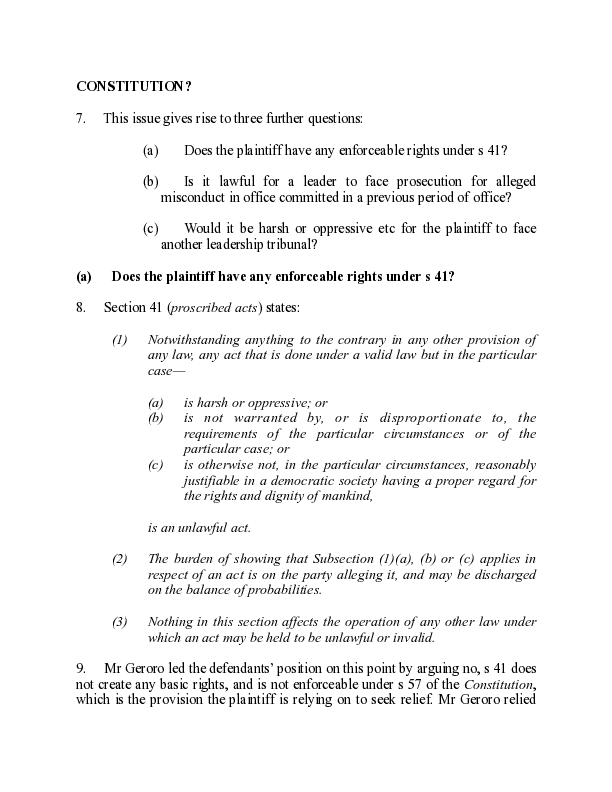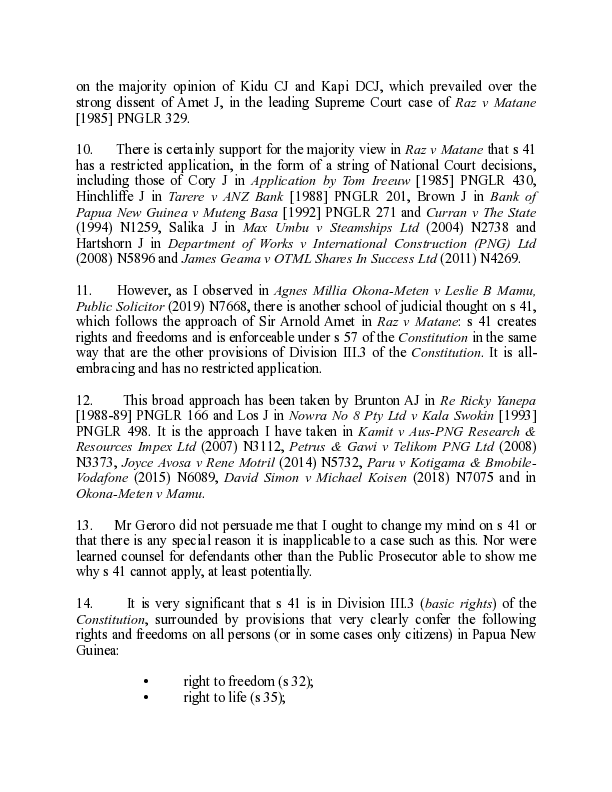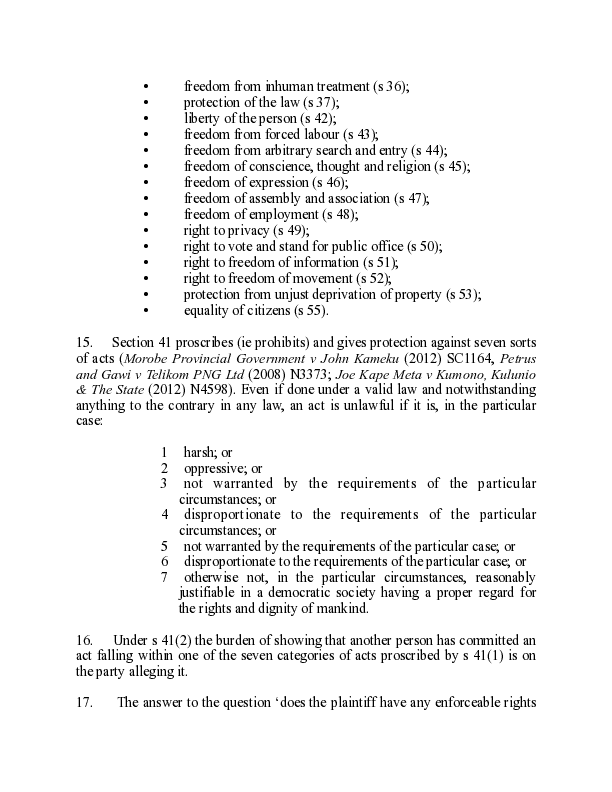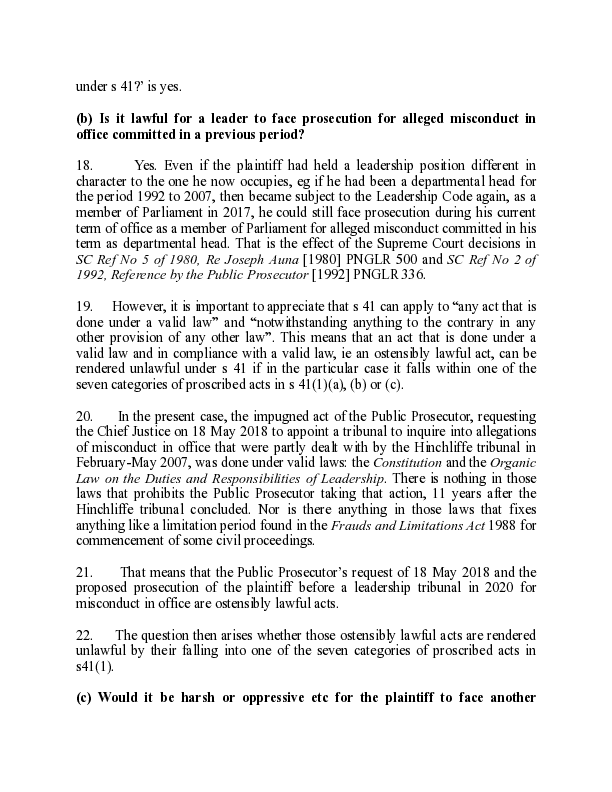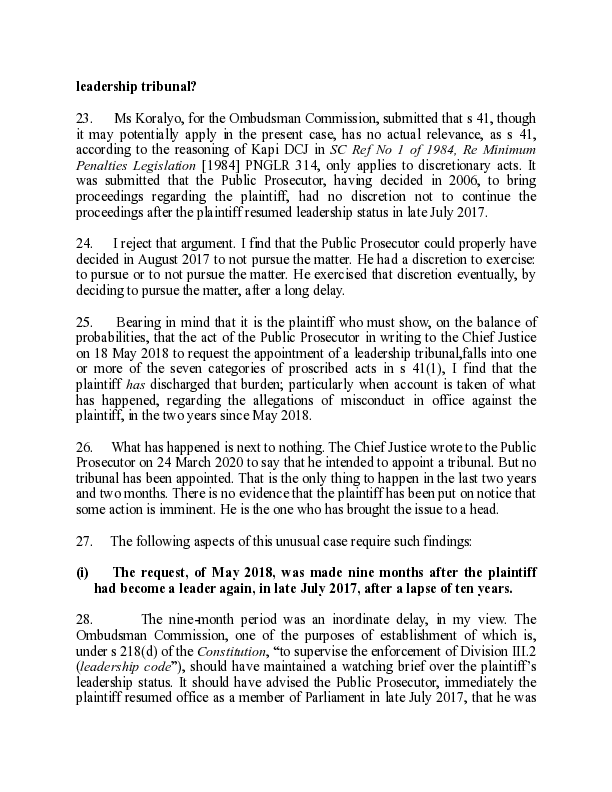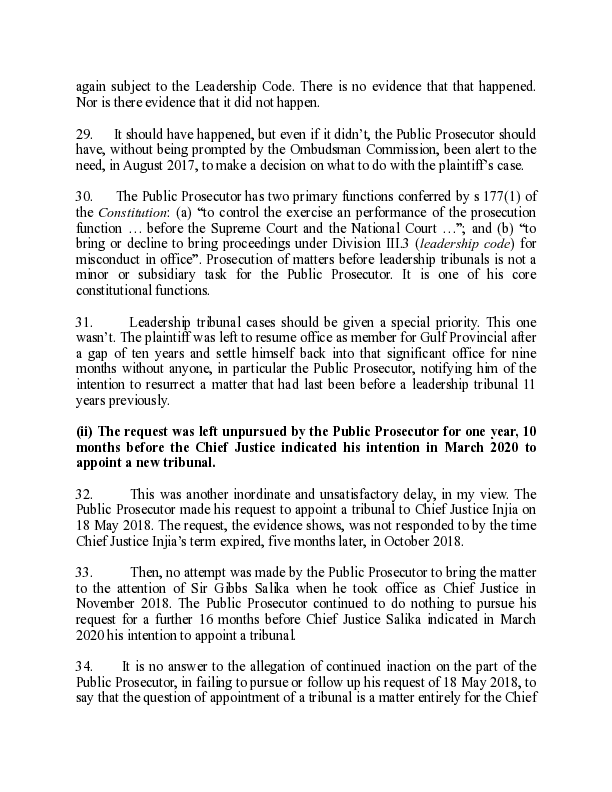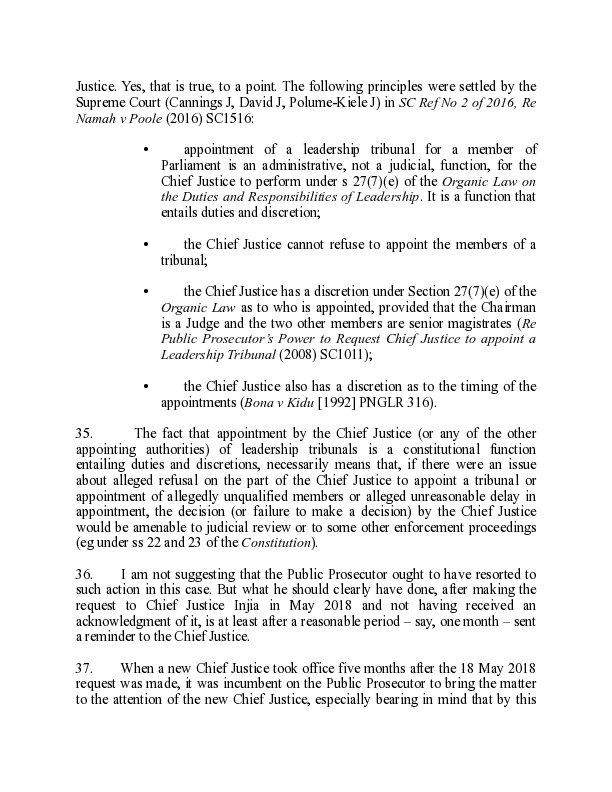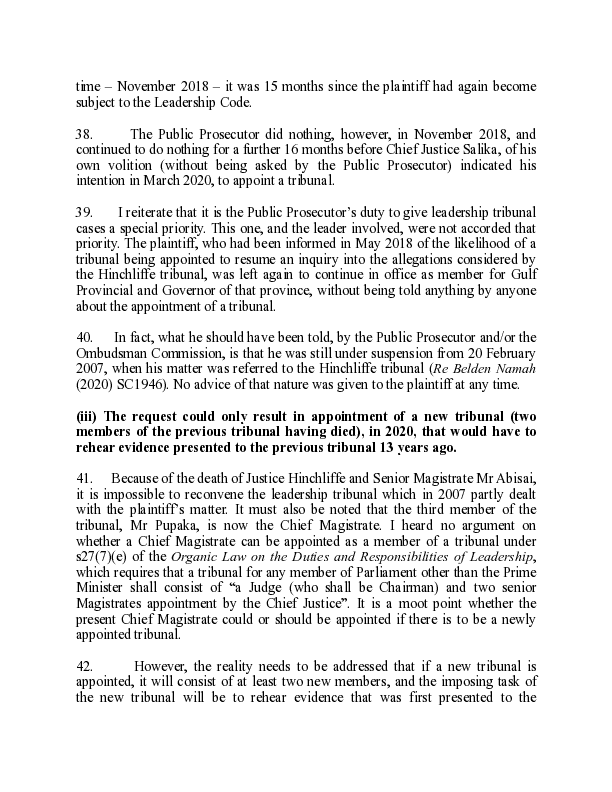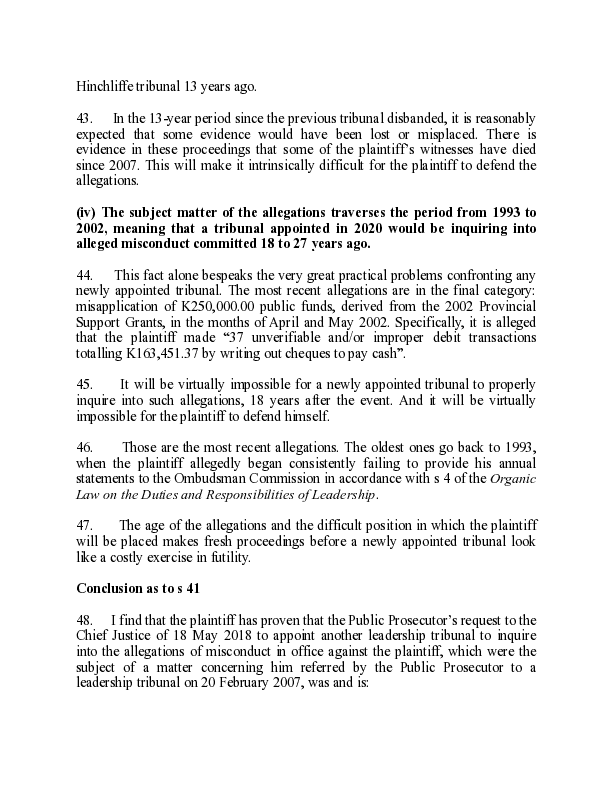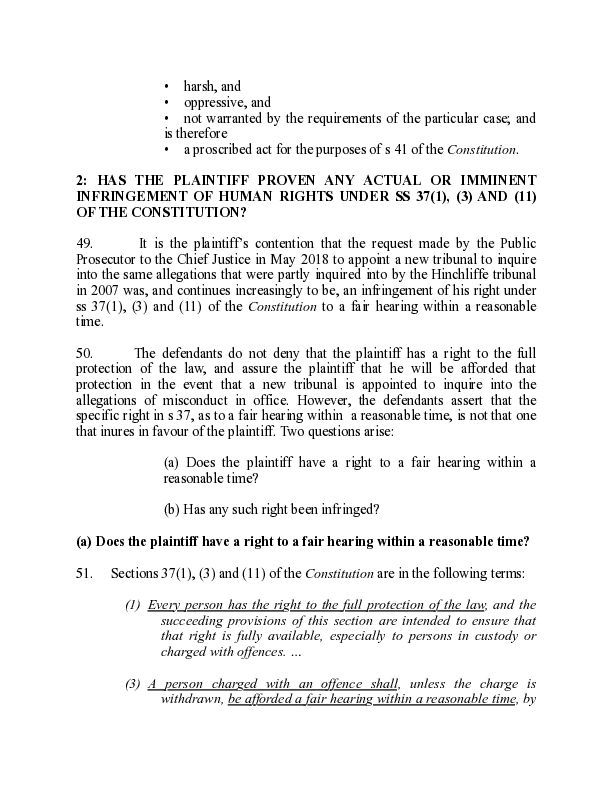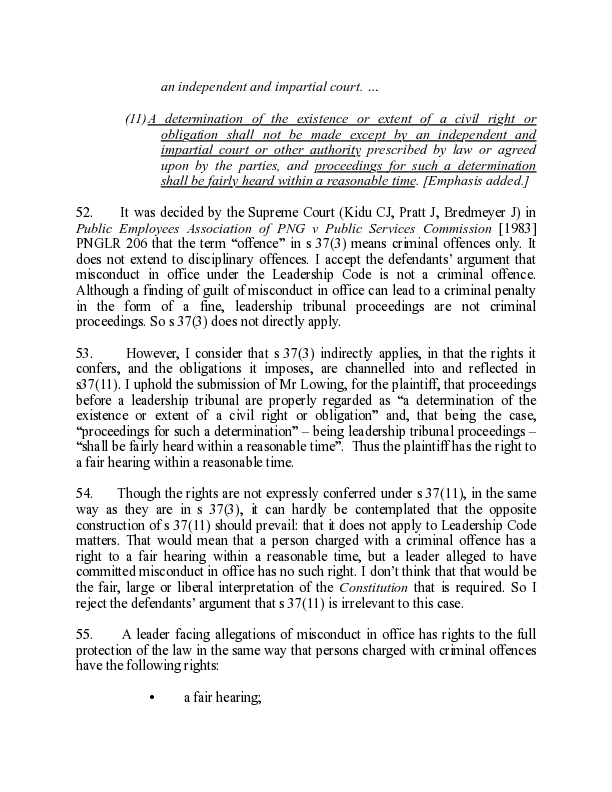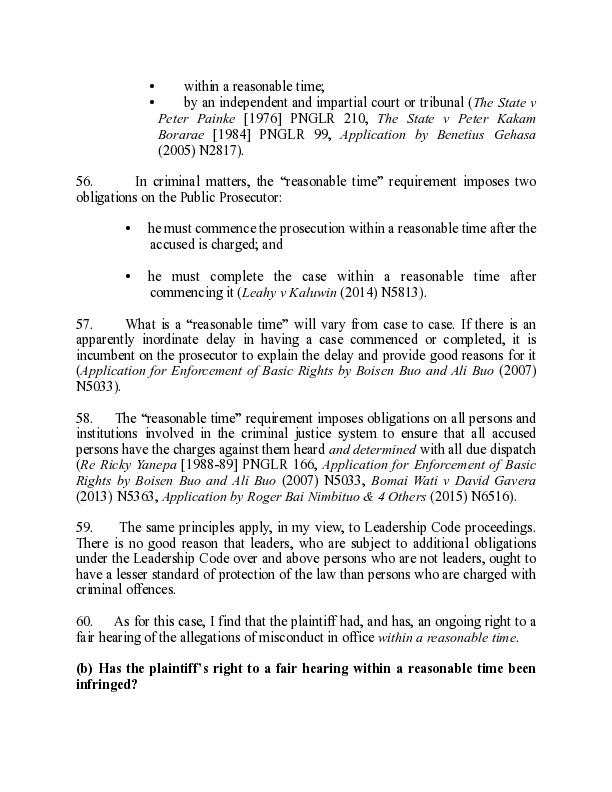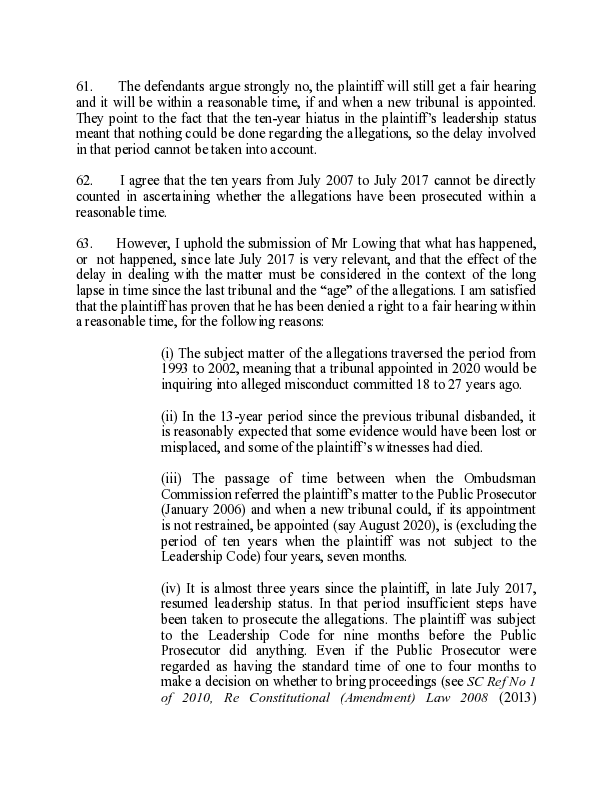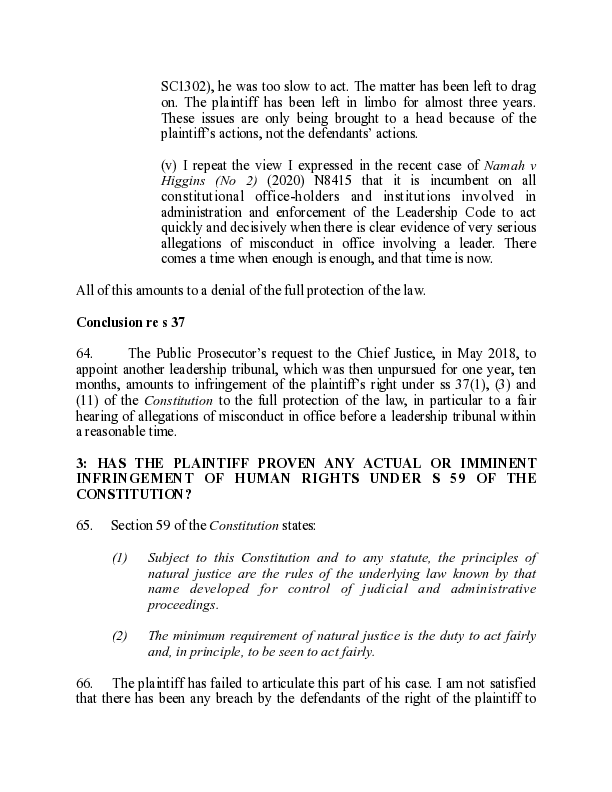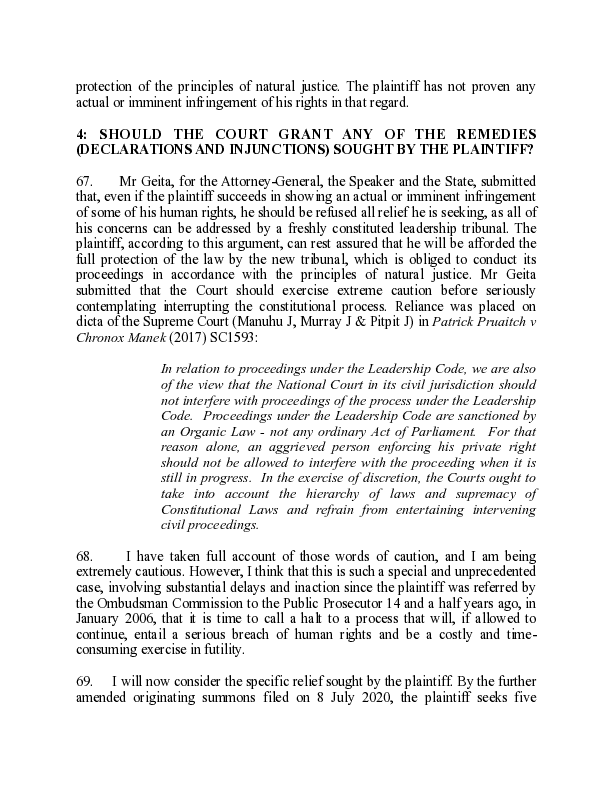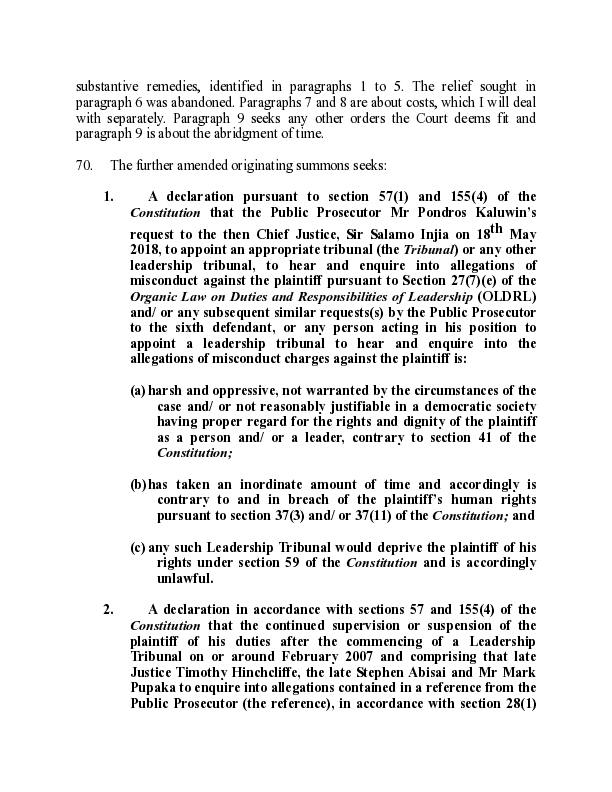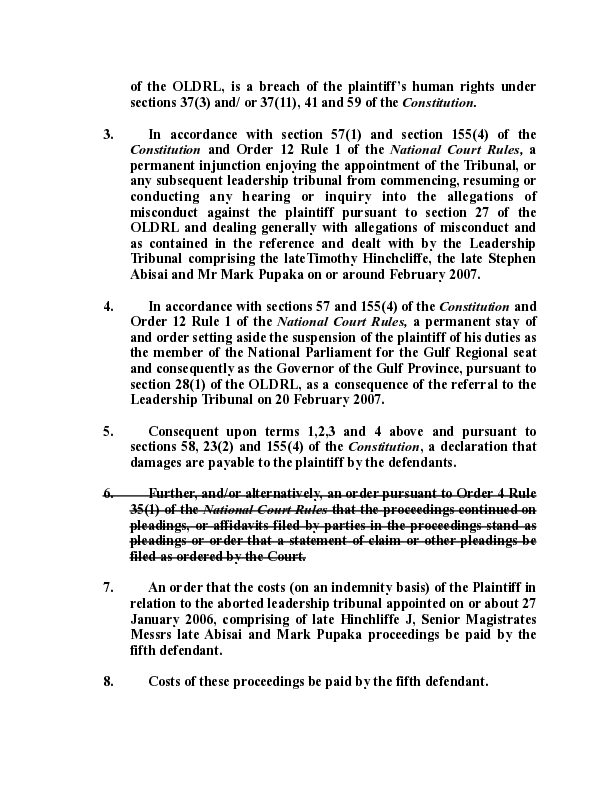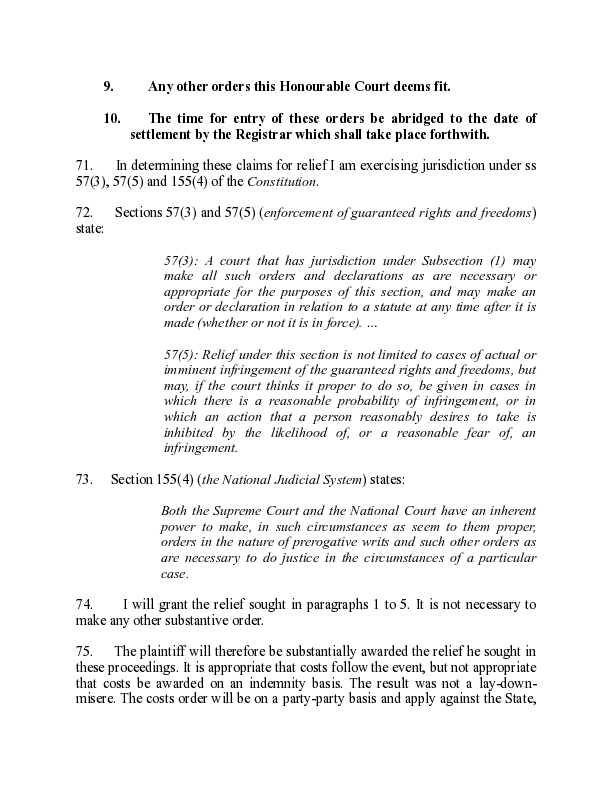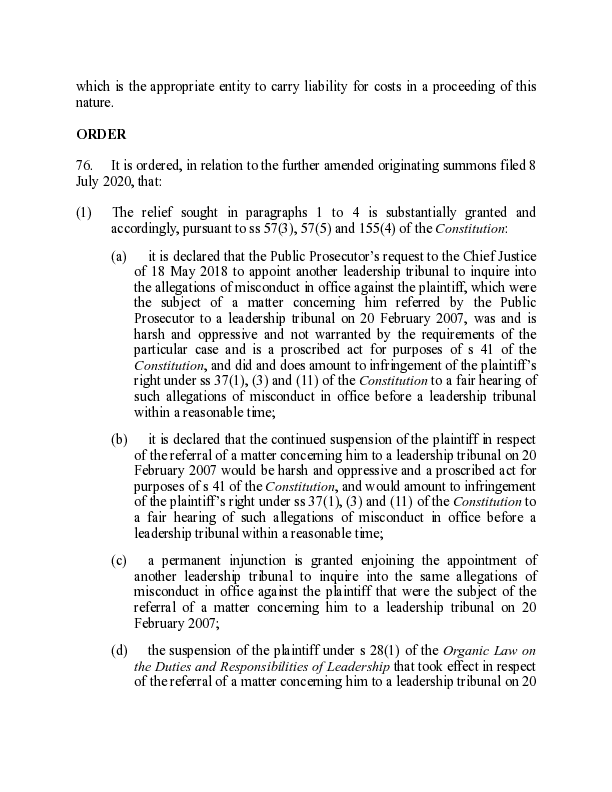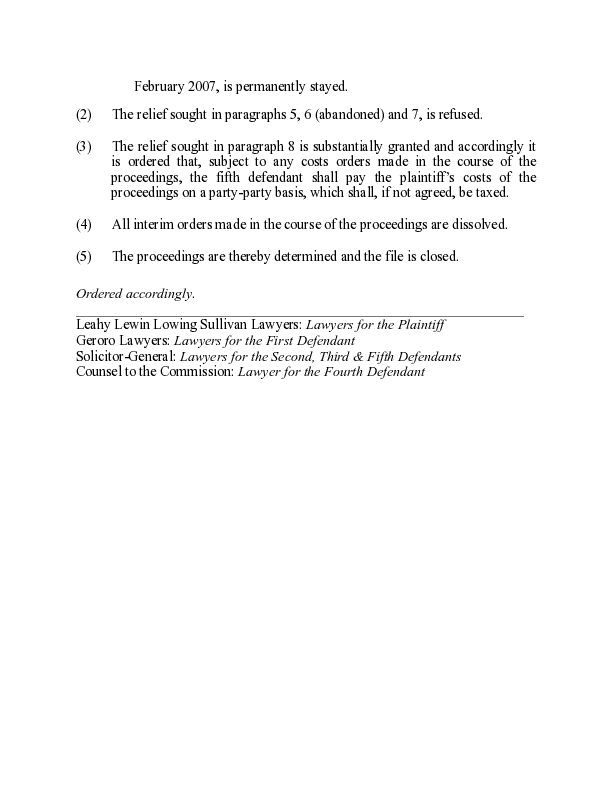Haiveta v Kaluwin [2020] N8430
Mentions of people and company names in this document
It is not suggested or implied that simply because a person, company or other entity is mentioned in the documents in the database that they have broken the law or otherwise acted improperly. Read our full disclaimer
Document content
-
N8430
PAPUA NEW GUINEA
[IN THE NATIONAL COURT OF JUSTICE]OS (HR) NO 3 OF 2020
CHRISTOPHER SESEVE HAIVETA, GOVERNOR, GULF PROVINCE
PlaintiffV
PONDROS KALUWIN, PUBLIC PROSECUTOR
First DefendantHONOURABLE JOB POMAT, SPEAKER, NATIONAL PARLIAMENT
Second DefendantHONOURABLE DAVIS STEVEN, ATTORNEY-GENERAL
Third DefendantOMBUDSMAN COMMISSION
Fourth DefendantTHE INDEPENDENT STATE OF PAPUA NEW GUINEA
Fifth DefendantHONOURABLE SIR GIBBS SALIKA, CHIEF JUSTICE
Sixth DefendantWaigani: Cannings J
2020: 10th, 17th, 27th JulyHUMAN RIGHTS – application for enforcement – Leadership Code
proceedings – request by Public Prosecutor to Chief Justice to appoint
leadership tribunal – whether Public Prosecutor’s request infringed human
rights of leader – lapse of more than 11 years after previous tribunal inquiring
into same allegations of misconduct was disbanded – whether Public
Prosecutor’s request was harsh, oppressive etc under Constitution, s 41
(proscribed acts) – whether appointment of second tribunal would infringe -
Page 2 of 29
-
leader’s right to fair hearing within a reasonable time – Constitution, s 37
(protection of the law) – whether Public Prosecutor’s request entailed breach of
the principles of natural justice – Constitution, s 59 (principles of natural
justice).REMEDIES – whether necessary or appropriate to grant: declarations as to
breach of human rights, injunction to restrain appointment of another tribunal,
permanent stay of leader’s suspension –Constitution, s 57 (enforcement of
guaranteed rights and freedoms), s 155(4) (the national judicial system).The plaintiff, a member of the National Parliament, commenced proceedings by
originating summons in the National Court, seeking declarations as to the breach
of his human rights and permanent injunctions regarding the proposed
appointment in 2020 of a leadership tribunal to inquire into allegations of
misconduct in office against him, which were the subject of a matter concerning
him referred to a leadership tribunal in February 2007. The plaintiff claimed that a
request to appoint a new tribunal to inquire into the same allegations, made by the
Public Prosecutor to the Chief Justice in May 2018, was harsh and oppressive for
purposes of s 41 of the Constitution, amounted to infringement of his right under
ss 37(1), (3) and (11) of the Constitution to a fair hearing within a reasonable time
and would deprive him of the right to a fair hearing and protection of the
principles of natural justice under s 59 of the Constitution. The defendants were
the Public Prosecutor, the Speaker, the Attorney-General, the Ombudsman
Commission, the State and the Chief Justice. All apart from the Chief Justice
participated in the proceedings, and opposed all relief sought by the plaintiff.Held:
(1) The Public Prosecutor’s request to the Chief Justice in May 2018 to appoint
another leadership tribunal was harsh, oppressive and not warranted by the
requirements of the particular circumstances for purposes of s 41 of the
Constitution as: (a) the request was made nine months after the plaintiff
had become a leader again, after a lapse of ten years; (b) the request was
left un-pursued by the Public Prosecutor for one year, 10 months before the
Chief Justice indicated his intention in March 2020 to appoint a new
tribunal; (c) the request could only result in appointment of a new tribunal
(two members of the previous tribunal having died), in 2020, that would
have to rehear evidence presented to the previous tribunal 13 years ago; (d)
in the 13-year period since the previous tribunal disbanded, it is reasonably -
Page 3 of 29
-
expected that some evidence would have been lost or misplaced, and some
of the plaintiff’s witnesses had died; (e) the subject matter of the
allegations traversed the period from 1993 to 2002, meaning that a tribunal
appointed in 2020 would be inquiring into alleged misconduct committed
18 to 27 years ago.(2) The Public Prosecutor’s request to the Chief Justice, in May 2018, to
appoint another leadership tribunal, unpursued for one year, ten months,
amounted to infringement of the plaintiff’s right under ss 37(1), (3) and
(11) of the Constitution to the full protection of the law, in particular to a
fair hearing of allegations of misconduct in office before a leadership
tribunal within a reasonable time, in that the appointment in 2020 of a new
tribunal cannot result in a fair hearing or a hearing within a reasonable
time, due to: (a) the subject matter of the allegations traversed the period
from 1993 to 2002, meaning that a tribunal appointed in 2020 would be
inquiring into alleged misconduct committed 18 to 27 years ago; (b) in the
13-year period since the previous tribunal disbanded, it is reasonably
expected that some evidence would have been lost or misplaced, and some
of the plaintiff’s witnesses had died; (c) the passage of time between when
the Ombudsman Commission referred the plaintiff’s matter to the Public
Prosecutor (January 2006) and when a new tribunal could, if its
appointment is not restrained, be appointed (say August 2020), is
(excluding the period of ten years from August 2007 to August 2017 when
the plaintiff was not subject to the Leadership Code)was four years, seven
months.(3) Declarations were made that the plaintiff’s human rights under ss 41(1) and
37(1), (3) and (11) of the Constitution had been and would, if not
restrained, be further infringed, and a permanent injunction was granted,
enjoining the appointment of a new tribunal to inquire into the allegations
referred to the previous tribunal in February 2007, and a permanent stay of
the plaintiff’s February 2007 suspension was granted.Cases Cited
The following cases are cited in the judgment:
-
Page 4 of 29
-
Application by Benetius Gehasa (2005) N2817
Application by Roger Bai Nimbituo & 4 Others (2015) N6516
Application for Enforcement of Basic Rights by Boisen Buo and Ali Buo (2007)
N5033
Bomai Wati v David Gavera (2013) N5363
Bona v Kidu [1992] PNGLR 316
Joe Kape Meta v Kumono, Kulunio & The State (2012) N4598
Joyce Avosa v Rene Motril (2014) N5732
Leahy v Kaluwin (2014) N5813
Morobe Provincial Government v John Kameku (2012) SC1164
David Simon v Michael Koisen (2018) N7075
Paru v Kotigama & Bmobile-Vodafone (2015) N6089
Petrus & Gawi v Telikom PNG Ltd (2008) N3373
Public Employees Association of PNG v Public Services Commission [1983]
PNGLR 206
Re Belden Namah (2020) SC1946
Re Public Prosecutor’s Power to Request Chief Justice to appoint a Leadership
Tribunal (2008) SC1011
Re Ricky Yanepa [1988-89] PNGLR 166
SC Ref No 1 of 1984, Re Minimum Penalties Legislation [1984] PNGLR 314
SC Ref No 2 of 1992, Reference by the Public Prosecutor [1992] PNGLR 336
SC Ref No 1 of 2010, Re Constitutional (Amendment) Law 2008 (2013) SC1302
SC Ref No 2 of 2016, Re Namah v Poole (2016) SC1516
SC Ref No 5 of 1980, Re Joseph Auna [1980] PNGLR 500
The State v Peter Kakam Borarae [1984] PNGLR 99
The State v Peter Painke [1976] PNGLR 210ORIGINATING SUMMONS
This was an application for enforcement of human rights in which the plaintiff
sought declarations and permanent injunctions to restrain appointment of a
leadership tribunal.Counsel
P A Lowing & P Andrew, for the Plaintiff
G Geroro, for the First Defendant -
Page 5 of 29
-
E S Geita & H Wangi, for the Second, Third and Fifth Defendants
R P Koralyo, for the Fourth Defendant27th July, 2020
1. CANNINGS J: The plaintiff, the Honourable Christopher Seseve Haiveta
MP, the Member for Gulf Provincial and Governor of Gulf Province, applies by
originating summons for enforcement of his human rights. He seeks declarations
and permanent injunctions regarding the proposed appointment in 2020 of a
leadership tribunal to inquire into allegations of misconduct in office against him,
which were the subject of a matter concerning him referred by the Public
Prosecutor to a leadership tribunal in February 2007.2. The plaintiff claims that a request made by the Public Prosecutor to the Chief
Justice in May 2018 to appoint a new tribunal to inquire into the same allegations,
was and continues increasingly to be:• harsh and oppressive for the purposes of s 41 of the
Constitution;• an infringement of his right under ss 37(1), (3) and (11) of the
Constitution to a fair hearing of such allegations of misconduct in
office before a leadership tribunal within a reasonable time; and• a deprivation of his right to a fair hearing and protection of the
principles of natural justice under s 59 of the Constitution.3. The defendants are:
• the Public Prosecutor, first defendant;
• the Speaker of the National Parliament, second defendant;
• the Attorney-General, third defendant;
• the Ombudsman Commission, fourth defendant;
• the State, fifth defendant; and
• the Chief Justice, sixth defendant.4. All defendants except the Chief Justice participated in the proceedings and
opposed all relief sought by the plaintiff. -
Page 6 of 29
-
ISSUES
5. Four issues arise:
1. Has the plaintiff proven any actual or imminent infringement
of human rights under s 41 of the Constitution?2. Has the plaintiff proven any actual or imminent infringement
of human rights under ss 37(1), (3) and (11) of the Constitution?3. Has the plaintiff proven any actual or imminent infringement
of human rights under s 59 of the Constitution?4. Should the Court grant any of the remedies (declarations and
injunctions) sought by the plaintiff?FACTS
1992-2005
6. The plaintiff was first elected as the member for Gulf Provincial at the 1992
general election. He was re-elected at the 1997 and 2002 general elections. His
holding office as a member of the National Parliament made him a leader and
subject to the Leadership Code under s 26(1)(c) of the Constitution.2006
31 January The Ombudsman Commission referred a matter of alleged
misconduct in office regarding the plaintiff to the Public
Prosecutor for prosecution before a leadership tribunal.30 August The Public Prosecutor requested the then Chief Justice, Sir Mari
Kapi, to appoint an appropriate tribunal to inquire into the
matter of alleged misconduct in office regarding the plaintiff,
which had been referred to the Public Prosecutor by the
Ombudsman Commission.6 October The Chief Justice appointed the tribunal comprising Justice Timothy
Hinchliffe as Chairman and senior magistrates Mr Stephen
Abisai and Mr Mark Pupaka. -
Page 7 of 29
-
2007
20 February The Public Prosecutor referred the matter to the Hinchliffe tribunal.
The plaintiff was thereupon suspended from duty under s
28(1) of the Organic Law on the Duties and Responsibilities of
Leadership. The matter referred to the tribunal was 28
allegations of misconduct in office, in four categories:(a) failing to furnish annual statements on time and failure
to cooperate with the Ombudsman Commission during the
period 1999-2002: allegation Nos 1 to 19;(b) misapplication of provincial support grants during the
period 1999-2001, K1,402,500.00: allegation Nos 20 to 22;(c) misapplication of public funds (Kerema-Malalaua road
upgrade and Yule Island Girls Boarding School) during the
period 2001-2002, K524,000.00: allegation Nos 23 to 25;(d) misapplication of public funds (provincial support
grants, discretionary component) during the period April-
May 2002, K250,000.00: allegation Nos 26 to 28.Feb-May The Hinchliffe tribunal conducted its proceedings. It completed the
process of hearing evidence presented by the Public
Prosecutor, then ruled against the plaintiff on a no-case
submission and then commenced hearing evidence for the
plaintiff.23 May The last day of the Hinchliffe tribunal. At that point the plaintiff had
given evidence and one other witness had given evidence for
him. The plaintiff, through his counsel, Mr R Pato, indicated
that he intended to call three more witnesses. However, the
tribunal, after hearing submissions from the parties, decided to
adjourn its proceedings to 6 August 2007, due to the
impending general election at which the plaintiff was a
candidate and the likelihood that it could not complete its
proceedings until after the polling period. -
Page 8 of 29
-
June-July The plaintiff lost his seat at the 2007 general election.
6 August The Hinchliffe tribunal convened briefly and formally disbanded as
the plaintiff was no longer subject to the Leadership Code and
the tribunal had no jurisdiction.Jul 07-Jul 17 In this ten-year period the plaintiff was not subject to the
Leadership Code as he was an unsuccessful candidate at both
the 2007 and the 2012 general elections and did not hold any
other leadership position. He was appointed Acting Secretary
to the National Executive Council in December 2011, but the
evidence is unclear for how long he occupied that office,
which appears, in any event, not to be a leadership office
under s 26(1) of the Constitution.2017
July The plaintiff was re-elected as member for Gulf Provincial at the 2017
general election. The precise date on which he took office
under s 104(1) of the Constitution (a member of the
Parliament takes office on the day immediately following the
day fixed for the return of the writ for the election in his
electorate) is not clear from the evidence. I estimate that it was
in late July.2018
18 May The Public Prosecutor wrote to the then Chief Justice, Sir Salamo
Injia, requesting the appointment of an appropriate tribunal to
inquire into the matter of alleged misconduct in office, which
had been referred by the Ombudsman Commission to the
Public Prosecutor in January 2006, and referred by the Public
Prosecutor to the Hinchliffe tribunal in February 2007. The
Public Prosecutor provided a background of the matter,
indicating that during the period since May 2007 two
members of the tribunal, Justice Hinchliffe and Mr Abisai, had
died. The Public Prosecutor’s request for appointment of a
tribunal was reported in the media. There was an exchange of
correspondence between the Public Prosecutor and the
plaintiff’s lawyers. The plaintiff was notified formally of the -
Page 9 of 29
-
Public Prosecutor’s intentions.
May-December There was no response to the Public Prosecutor’s 18 May
2018 request. On 31 October 2018 Sir Salamo Injia’s term of
office ended. Sir Gibbs Salika was appointed Chief Justice in
November 2018.2019
January-December Nothing happened throughout 2019 regarding the plaintiff’s
matter. The Public Prosecutor did nothing to follow up his 18
May 2018 request to Chief Justice Injia to appoint a tribunal.2020
24 March Chief Justice Salika wrote to the Public Prosecutor, indicating that
his understanding was that the leadership tribunal regarding
the plaintiff was left part-heard in 2007, that the plaintiff was
again subject to the Leadership Code, that it was a long
outstanding matter and that it was his intention to appoint
another leadership tribunal to complete the matter.14 April The Public Prosecutor acknowledged the Chief Justice’s letter of 24
March 2020 and said he awaited appointment of the tribunal.
He also said that the plaintiff had been advised of the intention
to appoint another tribunal. However, there is no evidence
(and it is not conceded by the plaintiff) that in fact the plaintiff
was advised of the Chief Justice’s intention.5 June The plaintiff commenced the present OS (HR) proceedings
17 June This Court granted, on application by the plaintiff, a declaration that
until further order of the Court he is not suspended from duty
arising out of his referral to the leadership tribunal in February
2007.I now address the four issues identified earlier.
1:HAS THE PLAINTIFF PROVEN ANY ACTUAL OR IMMINENT
INFRINGEMENT OF HUMAN RIGHTS UNDER S 41 OF THE -
Page 10 of 29
-
CONSTITUTION?
7. This issue gives rise to three further questions:
(a) Does the plaintiff have any enforceable rights under s 41?
(b) Is it lawful for a leader to face prosecution for alleged
misconduct in office committed in a previous period of office?(c) Would it be harsh or oppressive etc for the plaintiff to face
another leadership tribunal?(a) Does the plaintiff have any enforceable rights under s 41?
8. Section 41 (proscribed acts) states:
(1) Notwithstanding anything to the contrary in any other provision of
any law, any act that is done under a valid law but in the particular
case—(a) is harsh or oppressive; or
(b) is not warranted by, or is disproportionate to, the
requirements of the particular circumstances or of the
particular case; or
(c) is otherwise not, in the particular circumstances, reasonably
justifiable in a democratic society having a proper regard for
the rights and dignity of mankind,is an unlawful act.
(2) The burden of showing that Subsection (1)(a), (b) or (c) applies in
respect of an act is on the party alleging it, and may be discharged
on the balance of probabilities.(3) Nothing in this section affects the operation of any other law under
which an act may be held to be unlawful or invalid.9. Mr Geroro led the defendants’ position on this point by arguing no, s 41 does
not create any basic rights, and is not enforceable under s 57 of the Constitution,
which is the provision the plaintiff is relying on to seek relief. Mr Geroro relied -
Page 11 of 29
-
on the majority opinion of Kidu CJ and Kapi DCJ, which prevailed over the
strong dissent of Amet J, in the leading Supreme Court case of Raz v Matane
[1985] PNGLR 329.10. There is certainly support for the majority view in Raz v Matane that s 41
has a restricted application, in the form of a string of National Court decisions,
including those of Cory J in Application by Tom Ireeuw [1985] PNGLR 430,
Hinchliffe J in Tarere v ANZ Bank [1988] PNGLR 201, Brown J in Bank of
Papua New Guinea v Muteng Basa [1992] PNGLR 271 and Curran v The State
(1994) N1259, Salika J in Max Umbu v Steamships Ltd (2004) N2738 and
Hartshorn J in Department of Works v International Construction (PNG) Ltd
(2008) N5896 and James Geama v OTML Shares In Success Ltd (2011) N4269.11. However, as I observed in Agnes Millia Okona-Meten v Leslie B Mamu,
Public Solicitor (2019) N7668, there is another school of judicial thought on s 41,
which follows the approach of Sir Arnold Amet in Raz v Matane: s 41 creates
rights and freedoms and is enforceable under s 57 of the Constitution in the same
way that are the other provisions of Division III.3 of the Constitution. It is all-
embracing and has no restricted application.12. This broad approach has been taken by Brunton AJ in Re Ricky Yanepa
[1988-89] PNGLR 166 and Los J in Nowra No 8 Pty Ltd v Kala Swokin [1993]
PNGLR 498. It is the approach I have taken in Kamit v Aus-PNG Research &
Resources Impex Ltd (2007) N3112, Petrus & Gawi v Telikom PNG Ltd (2008)
N3373, Joyce Avosa v Rene Motril (2014) N5732, Paru v Kotigama & Bmobile-
Vodafone (2015) N6089, David Simon v Michael Koisen (2018) N7075 and in
Okona-Meten v Mamu.13. Mr Geroro did not persuade me that I ought to change my mind on s 41 or
that there is any special reason it is inapplicable to a case such as this. Nor were
learned counsel for defendants other than the Public Prosecutor able to show me
why s 41 cannot apply, at least potentially.14. It is very significant that s 41 is in Division III.3 (basic rights) of the
Constitution, surrounded by provisions that very clearly confer the following
rights and freedoms on all persons (or in some cases only citizens) in Papua New
Guinea:• right to freedom (s 32);
• right to life (s 35); -
Page 12 of 29
-
• freedom from inhuman treatment (s 36);
• protection of the law (s 37);
• liberty of the person (s 42);
• freedom from forced labour (s 43);
• freedom from arbitrary search and entry (s 44);
• freedom of conscience, thought and religion (s 45);
• freedom of expression (s 46);
• freedom of assembly and association (s 47);
• freedom of employment (s 48);
• right to privacy (s 49);
• right to vote and stand for public office (s 50);
• right to freedom of information (s 51);
• right to freedom of movement (s 52);
• protection from unjust deprivation of property (s 53);
• equality of citizens (s 55).15. Section 41 proscribes (ie prohibits) and gives protection against seven sorts
of acts (Morobe Provincial Government v John Kameku (2012) SC1164, Petrus
and Gawi v Telikom PNG Ltd (2008) N3373; Joe Kape Meta v Kumono, Kulunio
& The State (2012) N4598). Even if done under a valid law and notwithstanding
anything to the contrary in any law, an act is unlawful if it is, in the particular
case:1 harsh; or
2 oppressive; or
3 not warranted by the requirements of the particular
circumstances; or
4 disproportionate to the requirements of the particular
circumstances; or
5 not warranted by the requirements of the particular case; or
6 disproportionate to the requirements of the particular case; or
7 otherwise not, in the particular circumstances, reasonably
justifiable in a democratic society having a proper regard for
the rights and dignity of mankind.16. Under s 41(2) the burden of showing that another person has committed an
act falling within one of the seven categories of acts proscribed by s 41(1) is on
the party alleging it.17. The answer to the question ‘does the plaintiff have any enforceable rights
-
Page 13 of 29
-
under s 41?’ is yes.
(b) Is it lawful for a leader to face prosecution for alleged misconduct in
office committed in a previous period?18. Yes. Even if the plaintiff had held a leadership position different in
character to the one he now occupies, eg if he had been a departmental head for
the period 1992 to 2007, then became subject to the Leadership Code again, as a
member of Parliament in 2017, he could still face prosecution during his current
term of office as a member of Parliament for alleged misconduct committed in his
term as departmental head. That is the effect of the Supreme Court decisions in
SC Ref No 5 of 1980, Re Joseph Auna [1980] PNGLR 500 and SC Ref No 2 of
1992, Reference by the Public Prosecutor [1992] PNGLR 336.19. However, it is important to appreciate that s 41 can apply to “any act that is
done under a valid law” and “notwithstanding anything to the contrary in any
other provision of any other law”. This means that an act that is done under a
valid law and in compliance with a valid law, ie an ostensibly lawful act, can be
rendered unlawful under s 41 if in the particular case it falls within one of the
seven categories of proscribed acts in s 41(1)(a), (b) or (c).20. In the present case, the impugned act of the Public Prosecutor, requesting
the Chief Justice on 18 May 2018 to appoint a tribunal to inquire into allegations
of misconduct in office that were partly dealt with by the Hinchliffe tribunal in
February-May 2007, was done under valid laws: the Constitution and the Organic
Law on the Duties and Responsibilities of Leadership. There is nothing in those
laws that prohibits the Public Prosecutor taking that action, 11 years after the
Hinchliffe tribunal concluded. Nor is there anything in those laws that fixes
anything like a limitation period found in the Frauds and Limitations Act 1988 for
commencement of some civil proceedings.21. That means that the Public Prosecutor’s request of 18 May 2018 and the
proposed prosecution of the plaintiff before a leadership tribunal in 2020 for
misconduct in office are ostensibly lawful acts.22. The question then arises whether those ostensibly lawful acts are rendered
unlawful by their falling into one of the seven categories of proscribed acts in
s41(1).(c) Would it be harsh or oppressive etc for the plaintiff to face another
-
Page 14 of 29
-
leadership tribunal?
23. Ms Koralyo, for the Ombudsman Commission, submitted that s 41, though
it may potentially apply in the present case, has no actual relevance, as s 41,
according to the reasoning of Kapi DCJ in SC Ref No 1 of 1984, Re Minimum
Penalties Legislation [1984] PNGLR 314, only applies to discretionary acts. It
was submitted that the Public Prosecutor, having decided in 2006, to bring
proceedings regarding the plaintiff, had no discretion not to continue the
proceedings after the plaintiff resumed leadership status in late July 2017.24. I reject that argument. I find that the Public Prosecutor could properly have
decided in August 2017 to not pursue the matter. He had a discretion to exercise:
to pursue or to not pursue the matter. He exercised that discretion eventually, by
deciding to pursue the matter, after a long delay.25. Bearing in mind that it is the plaintiff who must show, on the balance of
probabilities, that the act of the Public Prosecutor in writing to the Chief Justice
on 18 May 2018 to request the appointment of a leadership tribunal,falls into one
or more of the seven categories of proscribed acts in s 41(1), I find that the
plaintiff has discharged that burden; particularly when account is taken of what
has happened, regarding the allegations of misconduct in office against the
plaintiff, in the two years since May 2018.26. What has happened is next to nothing. The Chief Justice wrote to the Public
Prosecutor on 24 March 2020 to say that he intended to appoint a tribunal. But no
tribunal has been appointed. That is the only thing to happen in the last two years
and two months. There is no evidence that the plaintiff has been put on notice that
some action is imminent. He is the one who has brought the issue to a head.27. The following aspects of this unusual case require such findings:
(i) The request, of May 2018, was made nine months after the plaintiff
had become a leader again, in late July 2017, after a lapse of ten years.28. The nine-month period was an inordinate delay, in my view. The
Ombudsman Commission, one of the purposes of establishment of which is,
under s 218(d) of the Constitution, “to supervise the enforcement of Division III.2
(leadership code”), should have maintained a watching brief over the plaintiff’s
leadership status. It should have advised the Public Prosecutor, immediately the
plaintiff resumed office as a member of Parliament in late July 2017, that he was -
Page 15 of 29
-
again subject to the Leadership Code. There is no evidence that that happened.
Nor is there evidence that it did not happen.29. It should have happened, but even if it didn’t, the Public Prosecutor should
have, without being prompted by the Ombudsman Commission, been alert to the
need, in August 2017, to make a decision on what to do with the plaintiff’s case.30. The Public Prosecutor has two primary functions conferred by s 177(1) of
the Constitution: (a) “to control the exercise an performance of the prosecution
function … before the Supreme Court and the National Court …”; and (b) “to
bring or decline to bring proceedings under Division III.3 (leadership code) for
misconduct in office”. Prosecution of matters before leadership tribunals is not a
minor or subsidiary task for the Public Prosecutor. It is one of his core
constitutional functions.31. Leadership tribunal cases should be given a special priority. This one
wasn’t. The plaintiff was left to resume office as member for Gulf Provincial after
a gap of ten years and settle himself back into that significant office for nine
months without anyone, in particular the Public Prosecutor, notifying him of the
intention to resurrect a matter that had last been before a leadership tribunal 11
years previously.(ii) The request was left unpursued by the Public Prosecutor for one year, 10
months before the Chief Justice indicated his intention in March 2020 to
appoint a new tribunal.32. This was another inordinate and unsatisfactory delay, in my view. The
Public Prosecutor made his request to appoint a tribunal to Chief Justice Injia on
18 May 2018. The request, the evidence shows, was not responded to by the time
Chief Justice Injia’s term expired, five months later, in October 2018.33. Then, no attempt was made by the Public Prosecutor to bring the matter
to the attention of Sir Gibbs Salika when he took office as Chief Justice in
November 2018. The Public Prosecutor continued to do nothing to pursue his
request for a further 16 months before Chief Justice Salika indicated in March
2020 his intention to appoint a tribunal.34. It is no answer to the allegation of continued inaction on the part of the
Public Prosecutor, in failing to pursue or follow up his request of 18 May 2018, to
say that the question of appointment of a tribunal is a matter entirely for the Chief -
Page 16 of 29
-
Justice. Yes, that is true, to a point. The following principles were settled by the
Supreme Court (Cannings J, David J, Polume-Kiele J) in SC Ref No 2 of 2016, Re
Namah v Poole (2016) SC1516:• appointment of a leadership tribunal for a member of
Parliament is an administrative, not a judicial, function, for the
Chief Justice to perform under s 27(7)(e) of the Organic Law on
the Duties and Responsibilities of Leadership. It is a function that
entails duties and discretion;• the Chief Justice cannot refuse to appoint the members of a
tribunal;• the Chief Justice has a discretion under Section 27(7)(e) of the
Organic Law as to who is appointed, provided that the Chairman
is a Judge and the two other members are senior magistrates (Re
Public Prosecutor’s Power to Request Chief Justice to appoint a
Leadership Tribunal (2008) SC1011);• the Chief Justice also has a discretion as to the timing of the
appointments (Bona v Kidu [1992] PNGLR 316).35. The fact that appointment by the Chief Justice (or any of the other
appointing authorities) of leadership tribunals is a constitutional function
entailing duties and discretions, necessarily means that, if there were an issue
about alleged refusal on the part of the Chief Justice to appoint a tribunal or
appointment of allegedly unqualified members or alleged unreasonable delay in
appointment, the decision (or failure to make a decision) by the Chief Justice
would be amenable to judicial review or to some other enforcement proceedings
(eg under ss 22 and 23 of the Constitution).36. I am not suggesting that the Public Prosecutor ought to have resorted to
such action in this case. But what he should clearly have done, after making the
request to Chief Justice Injia in May 2018 and not having received an
acknowledgment of it, is at least after a reasonable period – say, one month – sent
a reminder to the Chief Justice.37. When a new Chief Justice took office five months after the 18 May 2018
request was made, it was incumbent on the Public Prosecutor to bring the matter
to the attention of the new Chief Justice, especially bearing in mind that by this -
Page 17 of 29
-
time – November 2018 – it was 15 months since the plaintiff had again become
subject to the Leadership Code.38. The Public Prosecutor did nothing, however, in November 2018, and
continued to do nothing for a further 16 months before Chief Justice Salika, of his
own volition (without being asked by the Public Prosecutor) indicated his
intention in March 2020, to appoint a tribunal.39. I reiterate that it is the Public Prosecutor’s duty to give leadership tribunal
cases a special priority. This one, and the leader involved, were not accorded that
priority. The plaintiff, who had been informed in May 2018 of the likelihood of a
tribunal being appointed to resume an inquiry into the allegations considered by
the Hinchliffe tribunal, was left again to continue in office as member for Gulf
Provincial and Governor of that province, without being told anything by anyone
about the appointment of a tribunal.40. In fact, what he should have been told, by the Public Prosecutor and/or the
Ombudsman Commission, is that he was still under suspension from 20 February
2007, when his matter was referred to the Hinchliffe tribunal (Re Belden Namah
(2020) SC1946). No advice of that nature was given to the plaintiff at any time.(iii) The request could only result in appointment of a new tribunal (two
members of the previous tribunal having died), in 2020, that would have to
rehear evidence presented to the previous tribunal 13 years ago.41. Because of the death of Justice Hinchliffe and Senior Magistrate Mr Abisai,
it is impossible to reconvene the leadership tribunal which in 2007 partly dealt
with the plaintiff’s matter. It must also be noted that the third member of the
tribunal, Mr Pupaka, is now the Chief Magistrate. I heard no argument on
whether a Chief Magistrate can be appointed as a member of a tribunal under
s27(7)(e) of the Organic Law on the Duties and Responsibilities of Leadership,
which requires that a tribunal for any member of Parliament other than the Prime
Minister shall consist of “a Judge (who shall be Chairman) and two senior
Magistrates appointment by the Chief Justice”. It is a moot point whether the
present Chief Magistrate could or should be appointed if there is to be a newly
appointed tribunal.42. However, the reality needs to be addressed that if a new tribunal is
appointed, it will consist of at least two new members, and the imposing task of
the new tribunal will be to rehear evidence that was first presented to the -
Page 18 of 29
-
Hinchliffe tribunal 13 years ago.
43. In the 13-year period since the previous tribunal disbanded, it is reasonably
expected that some evidence would have been lost or misplaced. There is
evidence in these proceedings that some of the plaintiff’s witnesses have died
since 2007. This will make it intrinsically difficult for the plaintiff to defend the
allegations.(iv) The subject matter of the allegations traverses the period from 1993 to
2002, meaning that a tribunal appointed in 2020 would be inquiring into
alleged misconduct committed 18 to 27 years ago.44. This fact alone bespeaks the very great practical problems confronting any
newly appointed tribunal. The most recent allegations are in the final category:
misapplication of K250,000.00 public funds, derived from the 2002 Provincial
Support Grants, in the months of April and May 2002. Specifically, it is alleged
that the plaintiff made “37 unverifiable and/or improper debit transactions
totalling K163,451.37 by writing out cheques to pay cash”.45. It will be virtually impossible for a newly appointed tribunal to properly
inquire into such allegations, 18 years after the event. And it will be virtually
impossible for the plaintiff to defend himself.46. Those are the most recent allegations. The oldest ones go back to 1993,
when the plaintiff allegedly began consistently failing to provide his annual
statements to the Ombudsman Commission in accordance with s 4 of the Organic
Law on the Duties and Responsibilities of Leadership.47. The age of the allegations and the difficult position in which the plaintiff
will be placed makes fresh proceedings before a newly appointed tribunal look
like a costly exercise in futility.Conclusion as to s 41
48. I find that the plaintiff has proven that the Public Prosecutor’s request to the
Chief Justice of 18 May 2018 to appoint another leadership tribunal to inquire
into the allegations of misconduct in office against the plaintiff, which were the
subject of a matter concerning him referred by the Public Prosecutor to a
leadership tribunal on 20 February 2007, was and is: -
Page 19 of 29
-
• harsh, and
• oppressive, and
• not warranted by the requirements of the particular case; and
is therefore
• a proscribed act for the purposes of s 41 of the Constitution.2: HAS THE PLAINTIFF PROVEN ANY ACTUAL OR IMMINENT
INFRINGEMENT OF HUMAN RIGHTS UNDER SS 37(1), (3) AND (11)
OF THE CONSTITUTION?49. It is the plaintiff’s contention that the request made by the Public
Prosecutor to the Chief Justice in May 2018 to appoint a new tribunal to inquire
into the same allegations that were partly inquired into by the Hinchliffe tribunal
in 2007 was, and continues increasingly to be, an infringement of his right under
ss 37(1), (3) and (11) of the Constitution to a fair hearing within a reasonable
time.50. The defendants do not deny that the plaintiff has a right to the full
protection of the law, and assure the plaintiff that he will be afforded that
protection in the event that a new tribunal is appointed to inquire into the
allegations of misconduct in office. However, the defendants assert that the
specific right in s 37, as to a fair hearing within a reasonable time, is not that one
that inures in favour of the plaintiff. Two questions arise:(a) Does the plaintiff have a right to a fair hearing within a
reasonable time?(b) Has any such right been infringed?
(a) Does the plaintiff have a right to a fair hearing within a reasonable time?
51. Sections 37(1), (3) and (11) of the Constitution are in the following terms:
(1) Every person has the right to the full protection of the law, and the
succeeding provisions of this section are intended to ensure that
that right is fully available, especially to persons in custody or
charged with offences. …(3) A person charged with an offence shall, unless the charge is
withdrawn, be afforded a fair hearing within a reasonable time, by -
Page 20 of 29
-
an independent and impartial court. …
(11)A determination of the existence or extent of a civil right or
obligation shall not be made except by an independent and
impartial court or other authority prescribed by law or agreed
upon by the parties, and proceedings for such a determination
shall be fairly heard within a reasonable time. [Emphasis added.]52. It was decided by the Supreme Court (Kidu CJ, Pratt J, Bredmeyer J) in
Public Employees Association of PNG v Public Services Commission [1983]
PNGLR 206 that the term “offence” in s 37(3) means criminal offences only. It
does not extend to disciplinary offences. I accept the defendants’ argument that
misconduct in office under the Leadership Code is not a criminal offence.
Although a finding of guilt of misconduct in office can lead to a criminal penalty
in the form of a fine, leadership tribunal proceedings are not criminal
proceedings. So s 37(3) does not directly apply.53. However, I consider that s 37(3) indirectly applies, in that the rights it
confers, and the obligations it imposes, are channelled into and reflected in
s37(11). I uphold the submission of Mr Lowing, for the plaintiff, that proceedings
before a leadership tribunal are properly regarded as “a determination of the
existence or extent of a civil right or obligation” and, that being the case,
“proceedings for such a determination” – being leadership tribunal proceedings –
“shall be fairly heard within a reasonable time”. Thus the plaintiff has the right to
a fair hearing within a reasonable time.54. Though the rights are not expressly conferred under s 37(11), in the same
way as they are in s 37(3), it can hardly be contemplated that the opposite
construction of s 37(11) should prevail: that it does not apply to Leadership Code
matters. That would mean that a person charged with a criminal offence has a
right to a fair hearing within a reasonable time, but a leader alleged to have
committed misconduct in office has no such right. I don’t think that that would be
the fair, large or liberal interpretation of the Constitution that is required. So I
reject the defendants’ argument that s 37(11) is irrelevant to this case.55. A leader facing allegations of misconduct in office has rights to the full
protection of the law in the same way that persons charged with criminal offences
have the following rights:• a fair hearing;
-
Page 21 of 29
-
• within a reasonable time;
• by an independent and impartial court or tribunal (The State v
Peter Painke [1976] PNGLR 210, The State v Peter Kakam
Borarae [1984] PNGLR 99, Application by Benetius Gehasa
(2005) N2817).56. In criminal matters, the “reasonable time” requirement imposes two
obligations on the Public Prosecutor:• he must commence the prosecution within a reasonable time after the
accused is charged; and• he must complete the case within a reasonable time after
commencing it (Leahy v Kaluwin (2014) N5813).57. What is a “reasonable time” will vary from case to case. If there is an
apparently inordinate delay in having a case commenced or completed, it is
incumbent on the prosecutor to explain the delay and provide good reasons for it
(Application for Enforcement of Basic Rights by Boisen Buo and Ali Buo (2007)
N5033).58. The “reasonable time” requirement imposes obligations on all persons and
institutions involved in the criminal justice system to ensure that all accused
persons have the charges against them heard and determined with all due dispatch
(Re Ricky Yanepa [1988-89] PNGLR 166, Application for Enforcement of Basic
Rights by Boisen Buo and Ali Buo (2007) N5033, Bomai Wati v David Gavera
(2013) N5363, Application by Roger Bai Nimbituo & 4 Others (2015) N6516).59. The same principles apply, in my view, to Leadership Code proceedings.
There is no good reason that leaders, who are subject to additional obligations
under the Leadership Code over and above persons who are not leaders, ought to
have a lesser standard of protection of the law than persons who are charged with
criminal offences.60. As for this case, I find that the plaintiff had, and has, an ongoing right to a
fair hearing of the allegations of misconduct in office within a reasonable time.(b) Has the plaintiff’s right to a fair hearing within a reasonable time been
infringed? -
Page 22 of 29
-
61. The defendants argue strongly no, the plaintiff will still get a fair hearing
and it will be within a reasonable time, if and when a new tribunal is appointed.
They point to the fact that the ten-year hiatus in the plaintiff’s leadership status
meant that nothing could be done regarding the allegations, so the delay involved
in that period cannot be taken into account.62. I agree that the ten years from July 2007 to July 2017 cannot be directly
counted in ascertaining whether the allegations have been prosecuted within a
reasonable time.63. However, I uphold the submission of Mr Lowing that what has happened,
or not happened, since late July 2017 is very relevant, and that the effect of the
delay in dealing with the matter must be considered in the context of the long
lapse in time since the last tribunal and the “age” of the allegations. I am satisfied
that the plaintiff has proven that he has been denied a right to a fair hearing within
a reasonable time, for the following reasons:(i) The subject matter of the allegations traversed the period from
1993 to 2002, meaning that a tribunal appointed in 2020 would be
inquiring into alleged misconduct committed 18 to 27 years ago.(ii) In the 13-year period since the previous tribunal disbanded, it
is reasonably expected that some evidence would have been lost or
misplaced, and some of the plaintiff’s witnesses had died.(iii) The passage of time between when the Ombudsman
Commission referred the plaintiff’s matter to the Public Prosecutor
(January 2006) and when a new tribunal could, if its appointment
is not restrained, be appointed (say August 2020), is (excluding the
period of ten years when the plaintiff was not subject to the
Leadership Code) four years, seven months.(iv) It is almost three years since the plaintiff, in late July 2017,
resumed leadership status. In that period insufficient steps have
been taken to prosecute the allegations. The plaintiff was subject
to the Leadership Code for nine months before the Public
Prosecutor did anything. Even if the Public Prosecutor were
regarded as having the standard time of one to four months to
make a decision on whether to bring proceedings (see SC Ref No 1
of 2010, Re Constitutional (Amendment) Law 2008 (2013) -
Page 23 of 29
-
SC1302), he was too slow to act. The matter has been left to drag
on. The plaintiff has been left in limbo for almost three years.
These issues are only being brought to a head because of the
plaintiff’s actions, not the defendants’ actions.(v) I repeat the view I expressed in the recent case of Namah v
Higgins (No 2) (2020) N8415 that it is incumbent on all
constitutional office-holders and institutions involved in
administration and enforcement of the Leadership Code to act
quickly and decisively when there is clear evidence of very serious
allegations of misconduct in office involving a leader. There
comes a time when enough is enough, and that time is now.All of this amounts to a denial of the full protection of the law.
Conclusion re s 37
64. The Public Prosecutor’s request to the Chief Justice, in May 2018, to
appoint another leadership tribunal, which was then unpursued for one year, ten
months, amounts to infringement of the plaintiff’s right under ss 37(1), (3) and
(11) of the Constitution to the full protection of the law, in particular to a fair
hearing of allegations of misconduct in office before a leadership tribunal within
a reasonable time.3: HAS THE PLAINTIFF PROVEN ANY ACTUAL OR IMMINENT
INFRINGEMENT OF HUMAN RIGHTS UNDER S 59 OF THE
CONSTITUTION?65. Section 59 of the Constitution states:
(1) Subject to this Constitution and to any statute, the principles of
natural justice are the rules of the underlying law known by that
name developed for control of judicial and administrative
proceedings.(2) The minimum requirement of natural justice is the duty to act fairly
and, in principle, to be seen to act fairly.66. The plaintiff has failed to articulate this part of his case. I am not satisfied
that there has been any breach by the defendants of the right of the plaintiff to -
Page 24 of 29
-
protection of the principles of natural justice. The plaintiff has not proven any
actual or imminent infringement of his rights in that regard.4: SHOULD THE COURT GRANT ANY OF THE REMEDIES
(DECLARATIONS AND INJUNCTIONS) SOUGHT BY THE PLAINTIFF?67. Mr Geita, for the Attorney-General, the Speaker and the State, submitted
that, even if the plaintiff succeeds in showing an actual or imminent infringement
of some of his human rights, he should be refused all relief he is seeking, as all of
his concerns can be addressed by a freshly constituted leadership tribunal. The
plaintiff, according to this argument, can rest assured that he will be afforded the
full protection of the law by the new tribunal, which is obliged to conduct its
proceedings in accordance with the principles of natural justice. Mr Geita
submitted that the Court should exercise extreme caution before seriously
contemplating interrupting the constitutional process. Reliance was placed on
dicta of the Supreme Court (Manuhu J, Murray J & Pitpit J) in Patrick Pruaitch v
Chronox Manek (2017) SC1593:In relation to proceedings under the Leadership Code, we are also
of the view that the National Court in its civil jurisdiction should
not interfere with proceedings of the process under the Leadership
Code. Proceedings under the Leadership Code are sanctioned by
an Organic Law – not any ordinary Act of Parliament. For that
reason alone, an aggrieved person enforcing his private right
should not be allowed to interfere with the proceeding when it is
still in progress. In the exercise of discretion, the Courts ought to
take into account the hierarchy of laws and supremacy of
Constitutional Laws and refrain from entertaining intervening
civil proceedings.68. I have taken full account of those words of caution, and I am being
extremely cautious. However, I think that this is such a special and unprecedented
case, involving substantial delays and inaction since the plaintiff was referred by
the Ombudsman Commission to the Public Prosecutor 14 and a half years ago, in
January 2006, that it is time to call a halt to a process that will, if allowed to
continue, entail a serious breach of human rights and be a costly and time-
consuming exercise in futility.69. I will now consider the specific relief sought by the plaintiff. By the further
amended originating summons filed on 8 July 2020, the plaintiff seeks five -
Page 25 of 29
-
substantive remedies, identified in paragraphs 1 to 5. The relief sought in
paragraph 6 was abandoned. Paragraphs 7 and 8 are about costs, which I will deal
with separately. Paragraph 9 seeks any other orders the Court deems fit and
paragraph 9 is about the abridgment of time.70. The further amended originating summons seeks:
1. A declaration pursuant to section 57(1) and 155(4) of the
Constitution that the Public Prosecutor Mr Pondros Kaluwin’s
request to the then Chief Justice, Sir Salamo Injia on 18th May
2018, to appoint an appropriate tribunal (the Tribunal) or any other
leadership tribunal, to hear and enquire into allegations of
misconduct against the plaintiff pursuant to Section 27(7)(e) of the
Organic Law on Duties and Responsibilities of Leadership (OLDRL)
and/ or any subsequent similar requests(s) by the Public Prosecutor
to the sixth defendant, or any person acting in his position to
appoint a leadership tribunal to hear and enquire into the
allegations of misconduct charges against the plaintiff is:(a) harsh and oppressive, not warranted by the circumstances of the
case and/ or not reasonably justifiable in a democratic society
having proper regard for the rights and dignity of the plaintiff
as a person and/ or a leader, contrary to section 41 of the
Constitution;(b)has taken an inordinate amount of time and accordingly is
contrary to and in breach of the plaintiff’s human rights
pursuant to section 37(3) and/ or 37(11) of the Constitution; and(c) any such Leadership Tribunal would deprive the plaintiff of his
rights under section 59 of the Constitution and is accordingly
unlawful.2. A declaration in accordance with sections 57 and 155(4) of the
Constitution that the continued supervision or suspension of the
plaintiff of his duties after the commencing of a Leadership
Tribunal on or around February 2007 and comprising that late
Justice Timothy Hinchcliffe, the late Stephen Abisai and Mr Mark
Pupaka to enquire into allegations contained in a reference from the
Public Prosecutor (the reference), in accordance with section 28(1) -
Page 26 of 29
-
of the OLDRL, is a breach of the plaintiff’s human rights under
sections 37(3) and/ or 37(11), 41 and 59 of the Constitution.3. In accordance with section 57(1) and section 155(4) of the
Constitution and Order 12 Rule 1 of the National Court Rules, a
permanent injunction enjoying the appointment of the Tribunal, or
any subsequent leadership tribunal from commencing, resuming or
conducting any hearing or inquiry into the allegations of
misconduct against the plaintiff pursuant to section 27 of the
OLDRL and dealing generally with allegations of misconduct and
as contained in the reference and dealt with by the Leadership
Tribunal comprising the lateTimothy Hinchcliffe, the late Stephen
Abisai and Mr Mark Pupaka on or around February 2007.4. In accordance with sections 57 and 155(4) of the Constitution and
Order 12 Rule 1 of the National Court Rules, a permanent stay of
and order setting aside the suspension of the plaintiff of his duties as
the member of the National Parliament for the Gulf Regional seat
and consequently as the Governor of the Gulf Province, pursuant to
section 28(1) of the OLDRL, as a consequence of the referral to the
Leadership Tribunal on 20 February 2007.5. Consequent upon terms 1,2,3 and 4 above and pursuant to
sections 58, 23(2) and 155(4) of the Constitution, a declaration that
damages are payable to the plaintiff by the defendants.6. Further, and/or alternatively, an order pursuant to Order 4 Rule
35(1) of the National Court Rules that the proceedings continued on
pleadings, or affidavits filed by parties in the proceedings stand as
pleadings or order that a statement of claim or other pleadings be
filed as ordered by the Court.7. An order that the costs (on an indemnity basis) of the Plaintiff in
relation to the aborted leadership tribunal appointed on or about 27
January 2006, comprising of late Hinchliffe J, Senior Magistrates
Messrs late Abisai and Mark Pupaka proceedings be paid by the
fifth defendant.8. Costs of these proceedings be paid by the fifth defendant.
-
Page 27 of 29
-
9. Any other orders this Honourable Court deems fit.
10. The time for entry of these orders be abridged to the date of
settlement by the Registrar which shall take place forthwith.71. In determining these claims for relief I am exercising jurisdiction under ss
57(3), 57(5) and 155(4) of the Constitution.72. Sections 57(3) and 57(5) (enforcement of guaranteed rights and freedoms)
state:57(3): A court that has jurisdiction under Subsection (1) may
make all such orders and declarations as are necessary or
appropriate for the purposes of this section, and may make an
order or declaration in relation to a statute at any time after it is
made (whether or not it is in force). …57(5): Relief under this section is not limited to cases of actual or
imminent infringement of the guaranteed rights and freedoms, but
may, if the court thinks it proper to do so, be given in cases in
which there is a reasonable probability of infringement, or in
which an action that a person reasonably desires to take is
inhibited by the likelihood of, or a reasonable fear of, an
infringement.73. Section 155(4) (the National Judicial System) states:
Both the Supreme Court and the National Court have an inherent
power to make, in such circumstances as seem to them proper,
orders in the nature of prerogative writs and such other orders as
are necessary to do justice in the circumstances of a particular
case.74. I will grant the relief sought in paragraphs 1 to 5. It is not necessary to
make any other substantive order.75. The plaintiff will therefore be substantially awarded the relief he sought in
these proceedings. It is appropriate that costs follow the event, but not appropriate
that costs be awarded on an indemnity basis. The result was not a lay-down-
misere. The costs order will be on a party-party basis and apply against the State, -
Page 28 of 29
-
which is the appropriate entity to carry liability for costs in a proceeding of this
nature.ORDER
76. It is ordered, in relation to the further amended originating summons filed 8
July 2020, that:(1) The relief sought in paragraphs 1 to 4 is substantially granted and
accordingly, pursuant to ss 57(3), 57(5) and 155(4) of the Constitution:
(a) it is declared that the Public Prosecutor’s request to the Chief Justice
of 18 May 2018 to appoint another leadership tribunal to inquire into
the allegations of misconduct in office against the plaintiff, which were
the subject of a matter concerning him referred by the Public
Prosecutor to a leadership tribunal on 20 February 2007, was and is
harsh and oppressive and not warranted by the requirements of the
particular case and is a proscribed act for purposes of s 41 of the
Constitution, and did and does amount to infringement of the plaintiff’s
right under ss 37(1), (3) and (11) of the Constitution to a fair hearing of
such allegations of misconduct in office before a leadership tribunal
within a reasonable time;
(b) it is declared that the continued suspension of the plaintiff in respect
of the referral of a matter concerning him to a leadership tribunal on 20
February 2007 would be harsh and oppressive and a proscribed act for
purposes of s 41 of the Constitution, and would amount to infringement
of the plaintiff’s right under ss 37(1), (3) and (11) of the Constitution to
a fair hearing of such allegations of misconduct in office before a
leadership tribunal within a reasonable time;
(c) a permanent injunction is granted enjoining the appointment of
another leadership tribunal to inquire into the same allegations of
misconduct in office against the plaintiff that were the subject of the
referral of a matter concerning him to a leadership tribunal on 20
February 2007;
(d) the suspension of the plaintiff under s 28(1) of the Organic Law on
the Duties and Responsibilities of Leadership that took effect in respect
of the referral of a matter concerning him to a leadership tribunal on 20 -
Page 29 of 29
-
February 2007, is permanently stayed.
(2) The relief sought in paragraphs 5, 6 (abandoned) and 7, is refused.(3) The relief sought in paragraph 8 is substantially granted and accordingly it
is ordered that, subject to any costs orders made in the course of the
proceedings, the fifth defendant shall pay the plaintiff’s costs of the
proceedings on a party-party basis, which shall, if not agreed, be taxed.(4) All interim orders made in the course of the proceedings are dissolved.
(5) The proceedings are thereby determined and the file is closed.
Ordered accordingly.
________________________________________________________________
Leahy Lewin Lowing Sullivan Lawyers: Lawyers for the Plaintiff
Geroro Lawyers: Lawyers for the First Defendant
Solicitor-General: Lawyers for the Second, Third & Fifth Defendants
Counsel to the Commission: Lawyer for the Fourth Defendant
